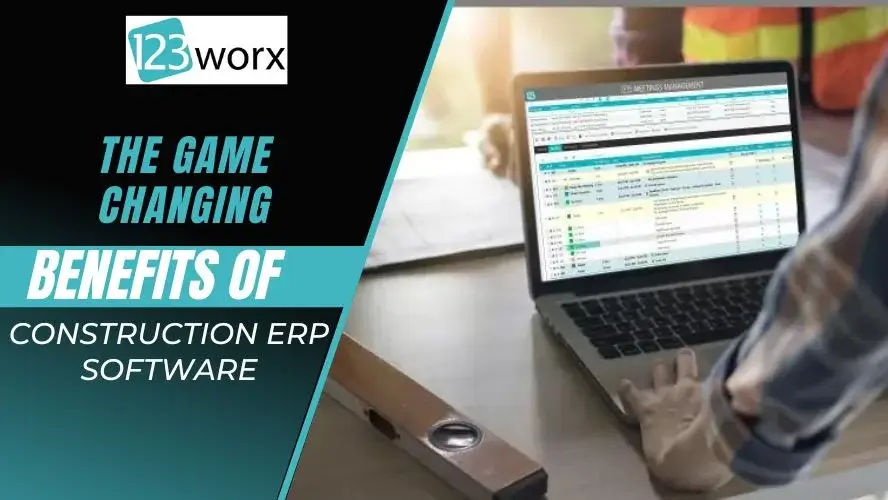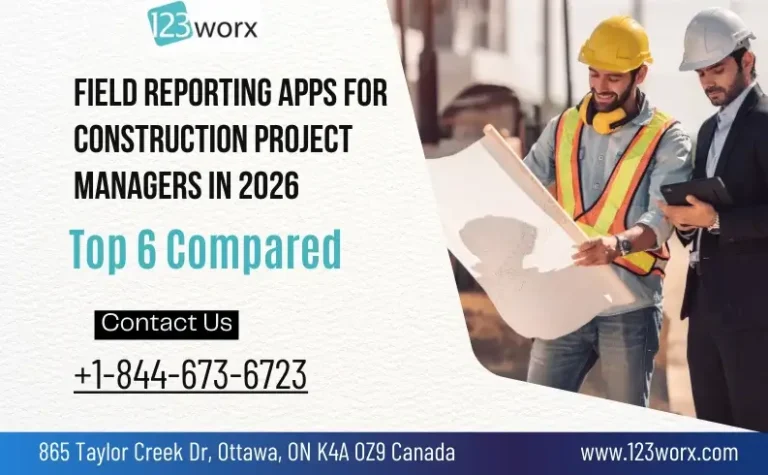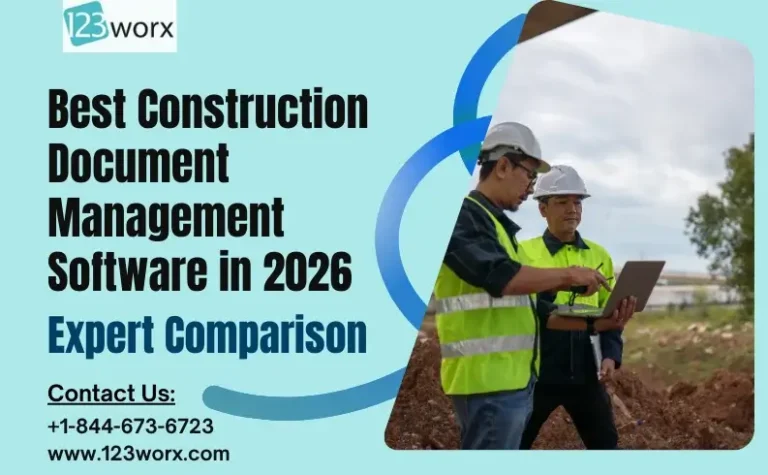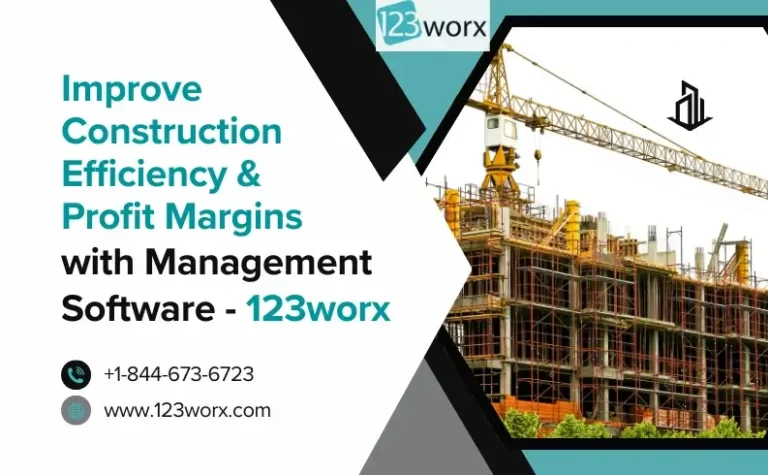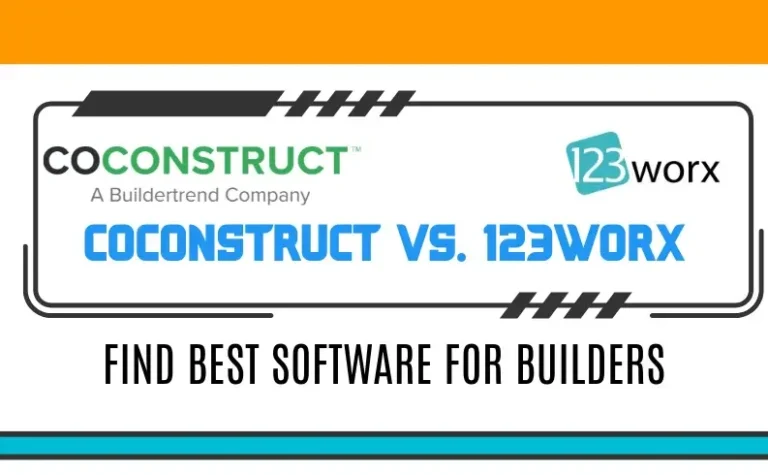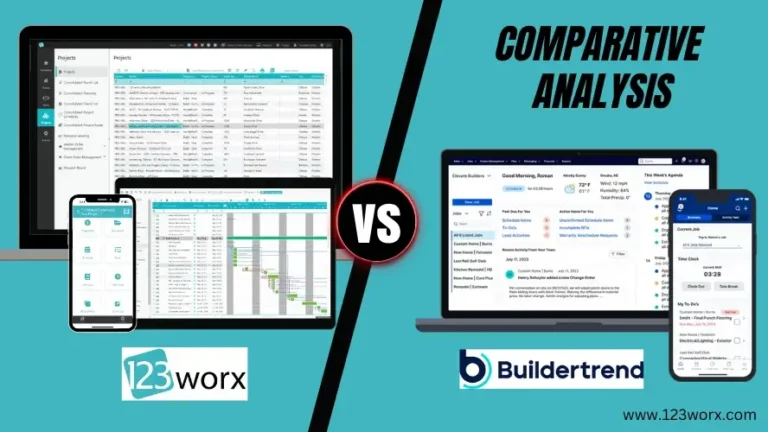The construction sector has its own set of challenges, tight timelines, diverse stakeholders, and intricate project coordination. Legacy tools fail to cut it, resulting in delays and increased costs. Here enters construction ERP software.
A Construction ERP Software consolidates project management, accounting, supply chain, HR, and compliance on a single platform. Through real-time information, automation, and centralized control, ERP in construction enables contractors to enhance efficiency, minimize risks, and increase profitability.
What is Construction ERP Software?
Construction ERP software is a specialized enterprise resource planning system designed for the construction industry. Unlike generic ERP tools, it includes modules for project management, cost estimation, procurement, subcontractor management, and compliance, making it an all-in-one solution for contractors and builders.
Integrating diverse construction management software features into a single platform makes this software a top choice for all construction companies, big and small.
Why Construction Companies Need ERP Systems?
The construction industry often comes with its own set of hurdles that naturally come with the type of work.
Handling multiple projects, subcontractors, suppliers, and other clients can often reduce the productivity and profits of construction firms. Additionally, outdated methods, lack of real-time data, and ineffective communication can only multiply these problems.
These challenges result in waste, delays, cost overruns, and unhappy clients. Here’s where best ERP software steps in to tackle these issues effectively.
How ERP Systems Solve Construction Industry Challenges
ERP solution in construction is the perfect solution to handle construction activities.
It stores all data in one place and automates processes, which cuts down on manual data input. This reduces mistakes and improves communication and teamwork better.
Real-time visibility into project progress, resource usage, and financials help construction companies make smart choices, anticipate problems, and promptly implement remedial steps.
Key Benefits of Construction ERP Software
- Competitive Advantage – ERP software boosts project effectiveness and precision. This gives companies an advantage in securing contracts and providing excellent outcomes.
- Financial Control – Getting immediate financial information helps with effective cost control and improved profits in all tasks and operations.
- Scalability – A Construction company can expand, taking on bigger, trickier projects. They can do this by streamlining procedures and better handling of resources.
- Data-Driven Decisions – Leaders can make smart choices using centralized data and analytics. These tools provide immediate, full information.
- Compliance and Risk Management – Using automatic tracking and record-keeping helps follow rules better, increases safety, and lessens potential legal and money problems.
In short, construction ERP software encompasses all project plans, schedules, accounting, purchases, and reports in construction management.
Top Features of Construction ERP Systems
Construction ERP systems are loaded with a wide range of features and functionalities especially tailored to suit the industry’s needs.
- Project Planning – Construction ERP Software helps in the effective planning and scheduling of construction projects and organizational resources. It allows managers to track project progress, manage tasks, and ensure that all work is done at the right time.
- Financial Management – With its integrated accounting modules, it provides precise cost tracking, easy budget management, and the preparation of financial reports. It simplifies financial oversight in construction by monitoring expenses, invoices, and cash flow.
- Supply Chain Management – Construction cloud ERP software makes procurement and inventory management very efficient. It helps companies track materials, manage supplier relations, and eliminate duplication in the purchasing process.
- Document Management – This is the area where construction ERP really improves document control, versioning, and accessibility tremendously by digitizing documents into a single repository. This ensures the right people have the right information at the right time.
- Human Resource Management – Construction ERP software’s Human Resource Management function handles workforce management across many projects and sites well. It often comes with utilities to keep track of employee time, letting workers record hours on particular tasks or projects, linking with payroll and job costing. This software aids in managing employee talents, certifications, and training needs, making sure every job gets the right, qualified people.
ERP in Construction: Integration with BIM, IoT & AI
Construction ERP software is revolutionizing the industry by seamlessly integrating with cutting-edge technologies. It’s easily merging with advanced tech, forming an enormous system for today’s construction management.
One of such examples is Building Information Modeling (BIM). Melding BIM with ERP allows synchronizing 3D designs with project plans and prices, finding issues, generating blueprints, and enhancing teamwork among all stakeholders. This integration guarantees a smooth flow of information from the start to finish of a project and even beyond.
The Internet of Things (IoT) is yet another tech transforming construction sites, with ERP software driving this change.
Integrating IoT can offer:
- Live tracking of ongoing work and scheduled tasks
- Ordering supplies automatically based on sensor info
- Monitoring the environment for safety and quality checks
- Balancing energy use for green building methods.
Such features not only improve efficiency but also add to safer, eco-friendly building projects.
Artificial Intelligence (AI) and Machine Learning (ML) are also big parts of current construction ERP software. These tech tools forecast project delays and cost overruns, optimize resource distribution, and make risk checking plans better.
Using AI, construction companies can make smarter choices and respond to possible issues before they alter project timeline or finances.
Business Benefits of Construction ERP Software
The introduction of construction ERP software brings many benefits to construction firms. A list of the benefits that it provides is as follows:
- Improved Efficiency – With features like automatic tech, construction accounting software, removal of repeat data entry, and up-to-the-minute visibility, construction ERP software boosts efficiency. It cuts down time wasted on paperwork, thus freeing up workers’ time for other value-adding activities.
- Enhanced Collaboration – The software encourages collaboration among the project team, subcontractors, and suppliers. Centrally stored data and tools for communication allow everyone involved in a project to reach the details they need. Thus, it enhances better cooperation and communication.
- Cost Savings – Cloud-based Construction Productivity Tools enable companies to allocate resources efficiently, identify new opportunities for saving on costs, and reduce wastage. Making processes smoother and more exact lowers the chances of going over budget or making expensive errors.
- Data-Driven Decision Making – The reporting and analytics functionalities provided by construction ERP software allow organizations to make data-driven decisions. Real-time insights into project performance, finance details, and vital factors for making informed choices. These offer a higher chance of success.
- Better Resource Management – Construction ERP software allows for excellent handling of resources and service management. It helps manage all that goes into building projects from materials and gadgets to the hard-working crew. Operating at best, it makes sure we’re not left short on materials by tracking use and auto-ordering. This avoids waste and delays from running out. It’s good news for equipment, too.
The software plans and monitors, making sure the machines are working well at multiple locations and that they’re getting proper upkeep to avoid idling.
Construction ERP vs General ERP Software
While general ERP applications suit different business sectors, construction ERP applications are designed specifically for the individual needs of builders and contractors.
- General ERP: Covers finance, HR, and supply chain but lacks construction-specific modules.
- Construction ERP: It comprises project planning, job estimating, subcontract management, and compliance tracking.
This sector emphasis enables construction ERP to better handle projects more efficiently, enhance collaboration, and manage costs.
The second significant difference is the level of customization. General ERP would require heavy customizations for compliance with construction work activities, and this could be costly and time-consuming. Construction ERP software, however, offers in-built estimating modules, procurement modules, equipment tracking modules, and field reporting modules, and hence reduces the custom development. Construction companies thereby attain the return on investment sooner and have a smooth implementation compared to customizing a general ERP system.
ROI of ERP Software in Construction
Installing ERP software for construction isn’t just a matter of operations; it’s a smart investment. It can save costs. It gets rid of unnecessary admin work, cuts mistakes and repetition, saves IT costs, and helps manage inventory better.
These savings mean contractors or companies themselves can use their resources better. Profits from projects also grow with the use of ERP software in construction.
Cost Saving Benefits:
- Use data to make more accurate construction cost estimations
- Spot and fix budget problems in real-time
- Lower costs by reducing idle time or overtime
- Finish projects faster and even get bonuses for early completion
Together, these points make every project make more money. This helps the company’s finances.
ERP software in construction also brings more money in the long run. Construction companies usually deliver more successful projects. They become more popular in the market. They manage their money better. Their decision-making skills improve because they rely on data. These systems also support growth without adding a lot of costs.
To see these benefits in action, let’s talk about a small or medium-sized construction company that started using ERP software.
In their experience:
- Project management costs reduced by 15%
- On-time projects improved by 20%
- Profit margins went up by 10% in the first year
- They got a 200% return on investment over three years
These numbers show that ERP software helps construction companies not just work better, but make more money. The initial cost is quickly covered by tangible costs and profit growth. It’s a must-have tool for any construction company that wants to stay ahead in the dynamic market.
Best Practices for ERP Implementation in Construction
Setting up the best construction ERP software requires careful planning and execution for A successful migration. Here are a few best practices and considerations that you need to consider:
- Set Define Goals – Firmly outline your goals and expectations for the implementation of the construction ERP software. Spot and highlight the particular issues you want to address and the specific results you anticipate.
- Engage stakeholders – Engage key stakeholders in decision-making across all departments. Their support and active involvement are big parts of successful changes and execution.
- Comprehensive Training – Involve every employee who will use the ERP software for construction in comprehensive training. This step is essential as it provides the skills and knowledge needed to fully leverage its advantages.
- Data Migration and Integration – Find out the migration process of the existing data to the new system and make sure it works well with any other software programs you have.
- Scalability and Customization – Think about the ways through which the ERP implementation for the construction industry may be scaled. It must adjust to fluctuating business needs and fit seamlessly with other tools or technologies.
Following these best practices and considerations will help any organization or project manager in smooth setup and optimal use of their ERP construction control software.
How to Choose the Best Construction ERP Software
Choosing the right building ERP software is quite significant as it influences your company’s growth and success. Here are some of the tips that help you to make a smart decision.
- Analyze Needs: Consider what sets your business apart and where challenges lie in your construction firm. Think about the complexity of projects, number of users, and integration requirements to identify the features and functionalities of the the software.
- Research Vendors: Research different ERP vendors. Look out for features like industry experience, reputation, customer reviews, and support services. Shortlist those vendors that will be able to meet your requirements.
- Request Demos and Trials: Request a demo and a trial from all the shortlisted vendors to get hands-on experience in Construction ERP software. This will enable you to evaluate whether it is user-friendly and usable and whether it will be compatible with your existing systems.
- Check references: Ask software providers for references, then reach out to existing customers. It’s important to inquire about their experience, problems, and victories when using it. This way, you can gain a clearer understanding of the supplier’s dependability and the software’s efficiency.
- Review Total Cost of Ownership: Examine the total cost of ownership and make a comparison of all the expenses associated with it, such as license fees, installation charges, training, and continuing support. Think about the long-term advantages and payback that will help you make a smart, knowledgeable choice.
Following these tips, you’ll get help in picking the right construction ERP software suited for your business. This way, you’ll guarantee continuous progress and victory in the future.
Construction ERP Software FAQs
Q1. What is construction ERP software?
Construction ERP software integrates general business functions—finance, human resources, supply chain—with construction-specific functions like project management, job costing, and subcontract coordination.
Q2. How much does construction ERP software cost?
The cost is vendor and deployment-based. Small businesses pay in the several-hundred-dollars-per-month range for the cloud ERP product, and the business solutions for enterprises in the several-thousand-dollars-per-end-user-per-year range.
Q3. What are the top construction ERP systems?
Familiar examples are SAP Business One for Construction, Oracle NetSuite, Microsoft Dynamics 365, and vertical-focused applications like 123worx.
Q4. How does cloud-based ERP support contractors?
Cloud ERP provides access to real-time information from any device, increases field and office collaboration, and reduces IT maintenance costs.
The Future of ERP in the Construction Industry
As Technology Keeps Evolving, The Construction software Grows Too.
Artificial Intelligence (AI) with the Internet of Things (IoT) is poised to define new ways of managing construction projects.
AI and ML, from predicting risks for a given project to optimizing the use of resources, can take away repetitive manual work. IoT can also increase a project’s efficiency and safety by keeping an eye on the site’s conditions, equipment, and materials.
Additionally, it’s predicted that this software will be paired with the Building Information Modeling (BIM) system. This will allow easy info exchange, 3D image viewing, and improved project coordination.
In essence, construction ERP solutions are an industry game-changer. It can handle the unique challenges construction companies meet, simplify tasks, and provide a real-time look at operations for general contractors and construction managers. This can lead to stronger growth and higher profits.
So, using the software could help companies outpace competitors in the construction sector in an ever-changing environment.

As a Vice President at 123worx, Construction Management Platform, Bharat Rudra has worked with hundreds of business executives searching for best-suited software for their construction business with a wide array of requirements. Bharat takes pride in helping construction businesses solve their business and project management challenges. Feel free to reach Bharat if you have any questions. You can find him on LinkedIn or reach him at brudra@123worx.com

